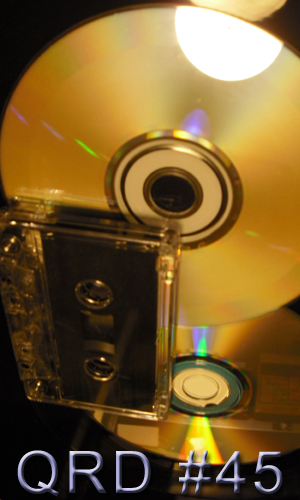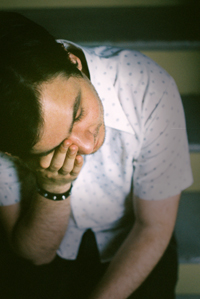













November 2010
Name: mr. kranky
Label: kranky
Artists Roster: numerous
Websites: kranky.net
QRD – When & why did you start your label?
mr. kranky – The label was started in 1993 specifically to release the debut album by Labradford.
QRD – Where did you get the money to finance your first few releases?
mr. kranky – I worked other jobs & saved.
QRD – How many releases have you put out?
mr. kranky – About 150 at the moment.
QRD – How many releases would you like to do a year?
mr. kranky – We don’t plan on any number of releases in a given year, we release things as artists complete them. But in general we average 10-12 releases annually.
QRD – What are the fun &/or rewarding parts about running a label?
mr. kranky – The music & the artists we work with.
QRD – What other work experiences prepared you to run a label?
mr. kranky – None.
QRD – What makes your label special & unique?
mr. kranky – The artists we work with.
QRD – How has your physical location effected your label?
mr. kranky – Not at all.
QRD – What‚s your demos policy?
mr. kranky – We listen to them.
QRD – How do you find out about new artists for your label?
mr. kranky – However we can.
QRD – How do most fans find out about your label?
mr. kranky – You would have to ask them.
QRD – What are some things that make you want to work with an artist?
mr. kranky – Only one, their talents.
QRD – What is the thing all releases on your label have in common?
mr. kranky – Quality.
QRD – What do you wish bands on your label would do?
mr. kranky – Sell more copies of their releases.
QRD – If you really like a band, but aren’t sure you could sell many copies of their record; what do you do?
mr. kranky – We do what we always do, sign them & release an album. The decision to work with any artist is based strictly on their art, not on commerce. We are never “sure” that we can sell many copies of a debut release from an artist; it’s a crapshoot at best. I can live with an album that I love that doesn’t sell that well, but I can’t at all imagine living with an album that I don’t love.
QRD – How is financing of a release split between artists & the label?
mr. kranky – The label finances all releases.
QRD – How do you split profits from a release between artists & your label?
mr. kranky – It’s a 50/50 profit split.
QRD – Do you have written contracts with your bands or handshake deals?
mr. kranky – Contracts.
QRD – Do you take a cut of a band‚s publishing?
mr. kranky – Absolutely not.
QRD – How important is it to you to have touring acts on your roster & what do you do to encourage it?
mr. kranky – It helps, but it’s a thankless job for most artists working at this level & we have never asked anyone to tour.
QRD – Do you handle promotions in house or hire out & why?
mr. kranky – In house for all but a few releases.
QRD – Do you view advertisements as a way to generate interest & revenue or more as a way to financially support magazines & websites you like?
mr. kranky – Strictly as a way to support media outlets that support us.
QRD – What is the job of your distributors?
mr. kranky – To fill orders.
QRD – How do you decide how big the initial pressing of a release should be?
mr. kranky – Educated guess.
QRD – Do you sell merchandise other than the music (t-shirts, etc.)?
mr. kranky – We sell t-shirts & hoodies & random non-kranky releases from artists we work with.
QRD – How has running a label effected your own artistic career?
mr. kranky – I don’t have one.
QRD – What’s your most common conversation with artists as far as balancing artistic integrity & financial viability?
mr. kranky – I have never had that conversation with any artist.
QRD – Do you think the album format is dead?
mr. kranky – No.
QRD – Do you think the return of vinyl & cassettes is a fad?
mr. kranky – I don’t know.
QRD – Is it important to have physical releases over digital ones or does it not matter?
mr. kranky – It matters at the moment.
QRD – What do you think of ultra-limited runs of releases (less than 100 discs)?
mr. kranky – I don’t think of them.
QRD – What do you think of “print on demand” discs?
mr. kranky – I don’t think of them.
QRD – What do you do about people distributing your music without financial compensation (piracy & file trading)?
mr. kranky – It’s sad. Most of the artists we work do not make a living from their art. If I showed up at someone’s job on payday & grabbed their paycheck as they were about to receive it, that would be wrong. I see these activities as the same thing.
QRD – What’s something you see other labels do that you think of as borderline unethical?
mr. kranky – Existing.
QRD – What would you suggest to someone starting a label today?
mr. kranky – Don’t.
QRD – Why do you think labels are still important to artists?
mr. kranky – It’s an established brand. As much as people would like to believe that the internet means you can be your own label, very few people have succeeded with that model.
QRD – In 20 years what do you think/hope your label will be known/remembered for?
mr. kranky – Releases that stand the test
of time.







